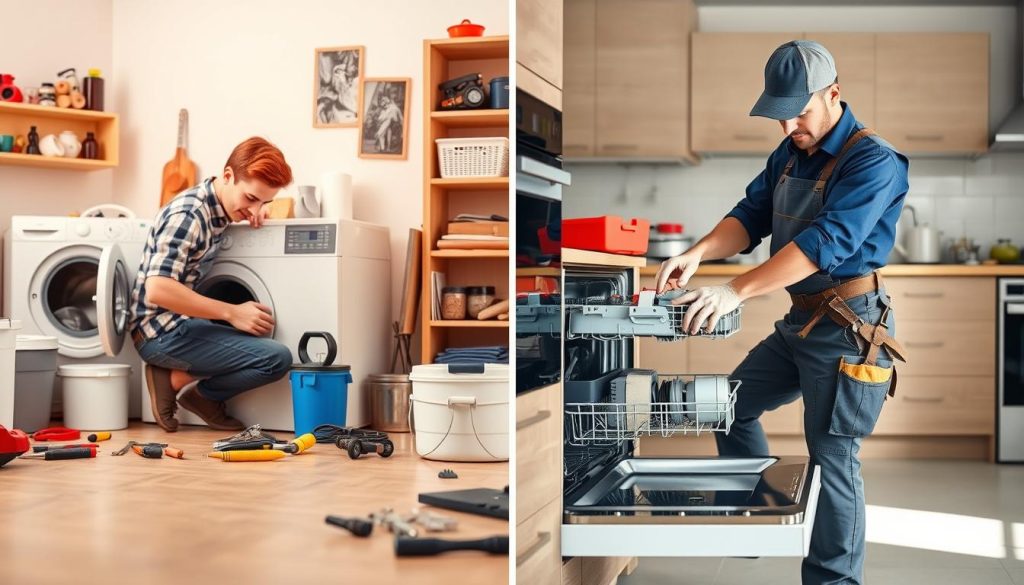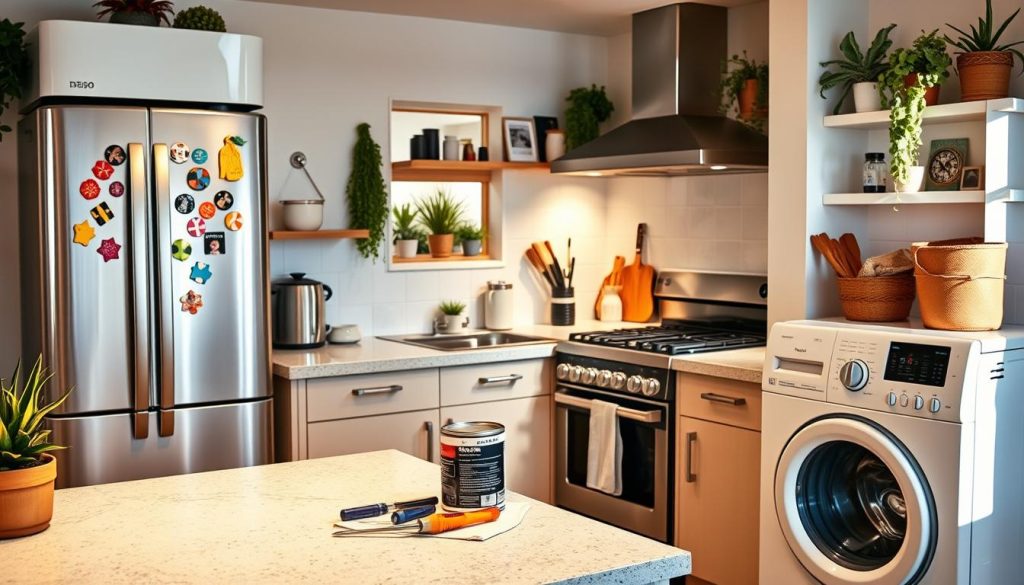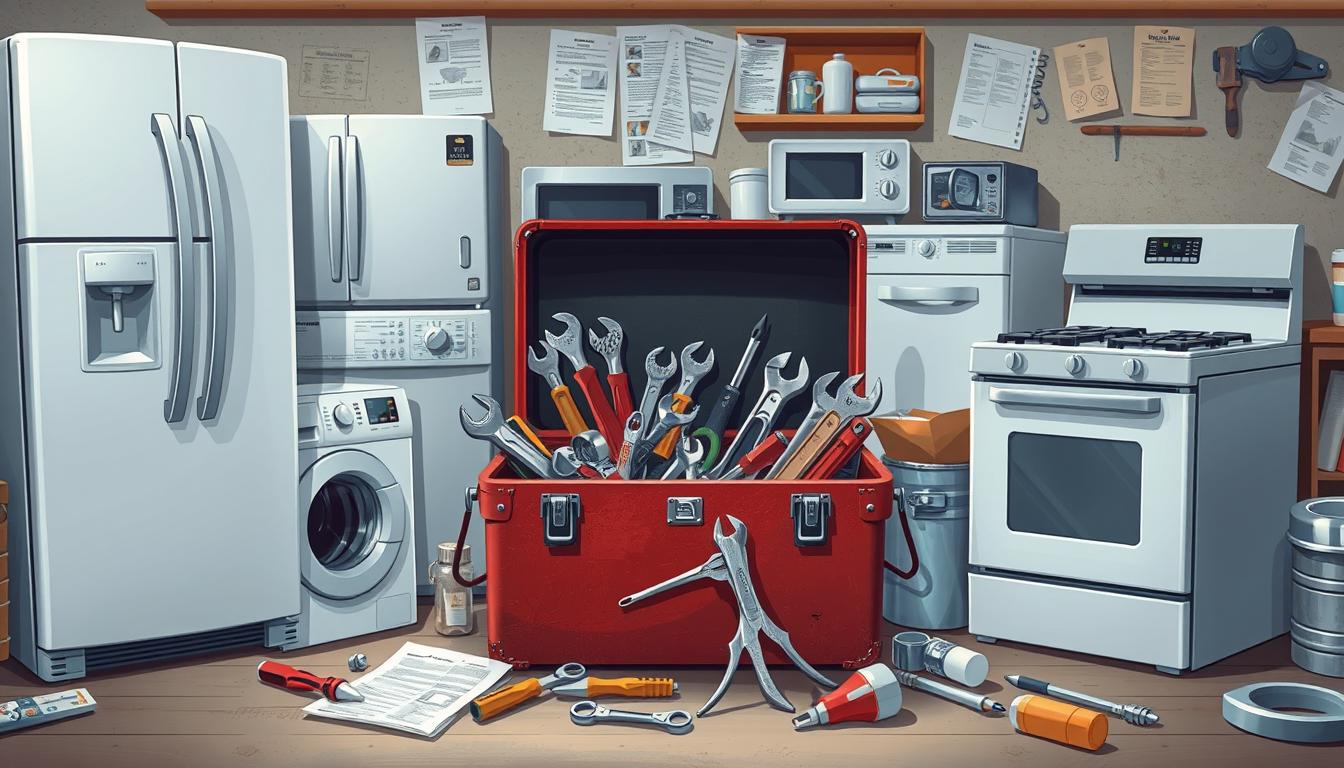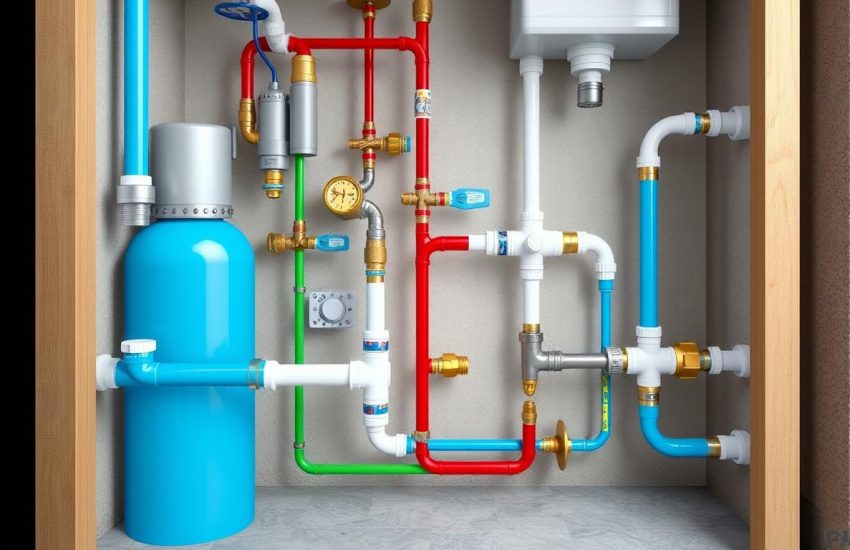Appliance Repair Tips: A Complete Guide for Homeowners
Ever had a dishwasher flood your kitchen? Or an oven that stopped working before dinner? You’re not alone. These problems can cause a lot of stress. Yet, they also offer a chance to improve your home. You can fix many issues yourself with DIY appliance repair tips. This saves money and time waiting for a pro. Let’s explore how to keep your appliances working smoothly.
Key Takeaways
- Understanding basic appliance maintenance can prevent the majority of common issues and extend the life of your appliances.
- Learning to implement DIY appliance repair tips can save homeowners significant costs on services and repairs.
- Regular cleaning is crucial, as it prevents 90% of problems caused by dirt and debris accumulation.
- Safety should always be a priority during repairs, with proper handling of electrical components to avoid accidents.
- Staying informed through resources like ManualsLib and being cautious not to worsen the issue with improper tools or techniques is key to successful DIY repairs.
- Some more complex issues involving gas appliances or electrical components might still require professional help, highlighting the balance between self-repair and expert intervention.
In home improvement, knowing how to care for your appliances is smart and saves money. Think about this: regular check-ups could prevent 75% of breakdowns. And, taking care of your appliances is safe; 80% of repair accidents are from wrong handling of electrical parts. So, if your fridge is too loud or your dishwasher won’t clean, the answer might be simpler than you think.
Why Focus on Appliance Repair Tips?
Saving money on appliance repair tips boosts homeowners’ confidence. It also makes home maintenance more efficient. Knowing how to fix appliance problems leads to quicker, cheaper solutions.
Learning your appliances’ basics helps manage home tasks better. This know-how allows for fast action when problems pop up. It saves money and time. Learning more about appliance repair shows when to fix it yourself or call a pro.
Being good at appliance repair brings peace of mind. You can handle sudden issues, which means less stress. This skill gives homeowners not just practical abilities but more independence too.
- Quick fixes save money and cut downtime, boosting efficiency.
- Seek pros for hard repairs to ensure safety and quality repair.
Focusing on appliance repair tips leads to savings and a better home.
DIY vs Professional Help
Homeowners often debate if they should follow affordable appliance repair tips or when to call a professional. This choice can be tricky. It involves looking at costs, skills needed, and possible risks.
Doing it yourself saves money because there are no service fees. This option is cheaper than hiring experts. People also enjoy fixing things on their own. It feels good to solve problems. Simple tasks like unclogging filters or changing fridge lights are easy and rewarding.

But, professional help has its own benefits. Technicians quickly find and fix many problems. They can handle big issues, like control board or motor problems, without making things worse. They use special tools and guarantee their work. This makes repairs more secure.
| Aspect | DIY Repair | Professional Repair |
|---|---|---|
| Learning Opportunity | High | Low |
| Initial Cost | Lower | Higher (vary by region) |
| Tool Availability | Limited | Specialized |
| Repair Security | None | Often guaranteed |
| Warranty Impact | Possible void | Generally maintained |
| Timeliness of Repair | Variable (depends on part shipping) | Swift |
DIY tips can save money and teach us things, but safety is most important. For electrical or gas issues, it’s best to call an expert. Also, if fixing costs nearly as much as a new appliance, it’s smarter to just replace it.
Knowing when to call a professional keeps your appliances working safely and well. It also saves you from expensive errors that could happen if you try to fix things without enough experience.
How to Save Money
Start by taking steps to keep appliance costs low. Check out this guide for money-saving tips on appliances. It’s really helpful for homeowners.
Keeping your appliances in good shape makes them last longer. It also helps them run better. For example, clean your fridge’s coils twice a year to save energy.
| Appliance | Maintenance Tip | Frequency |
|---|---|---|
| Refrigerator | Clean condenser coils | Twice a year |
| Dishwasher | Clean filter and run vinegar cycle | Monthly |
| Washing Machine | Clean dispenser, drum, and run hot water cycle with bleach | Monthly |
| Dryer | Clean lint trap | Each use |
Regularly looking after your home can prevent big repair costs. Choosing appliances that use less energy saves money, too.
Energy-efficient appliances should be kept free of dust and grime to ensure optimal performance.
Tools like those from Consumer Reports help decide to fix or replace an appliance. Small efforts in upkeep can mean big savings later on.
Using energy wisely is also key. Things like programmable thermostats help. Turning off gadgets when not needed cuts costs as well.
For more tips on saving through home improvements, check out reliable guides. They offer great advice on getting the best deals.
Step-by-Step Upgrades
Making your household appliances last longer and work better is important. Here is a guide with DIY appliance upgrades and performance enhancement tips. These will help you take care of your home appliances.

- Identifying common malfunctions such as overheating or unusual noise
- Following the manufacturer’s guidelines for basic troubleshooting
- Replacing or cleaning essential components like filters and vents
- Regular maintenance to prevent issues from escalating
- Consulting professional technicians for more complex problems
Handling small maintenance can stop big problems. For example, cleaning the lint trap in your dryer after each use cuts fire risks. Regularly cleaning air conditioner units boosts their efficiency and saves energy costs.
| Appliance | Common Sign of Wear | DIY Check/Replacement |
|---|---|---|
| Refrigerator | Frequent condensation or spoiled food | Check for door seal and clear drain hole |
| Dishwasher | Rust patches or strange noises | Inspect spray arm and replace if needed |
| Washing Machine | Not draining properly | Clean drain pump filter |
| Dryer | Increased drying time | Clear vent ducts and replace any worn belts |
| Microwave | Inconsistent heating or electrical issues | Check door seal and waveguide cover for damage |
When you do DIY appliance upgrades, know what you can handle. Don’t mess with high-voltage or gas parts. Always get a pro when needed, especially if there’s a risk or it might void a warranty.
If you’re not sure about a DIY upgrade, call in pros like those from AAA Service Network. They make sure things are done right. Doing these performance enhancement tips can make appliances run better and last longer.
Final Tips for Success
For DIY appliance repair, being ready makes a big difference. Keeping your appliances in good shape is key. Make sure you have all the tools you need. These include screwdrivers, wrenches, multimeters, and socket sets. Having the right tools and knowing what to do can help a lot. Always be safe. Make sure to turn off the power before starting.
Before fixing anything, understand the problem well. Look in your manuals or online to find out what’s wrong. If there are big problems, like with smart appliances, it’s better to call experts. They know how to fix things safely and keep warranties good. Also, use good parts for any repairs. This helps your appliances work well.
DIY repairs can save money and feel good. But sometimes, you need a professional. Doing regular checks keeps appliances working longer. For hard or dangerous repairs, getting help is smart. Mixing DIY with expert help is best for a great home. This way, your appliances stay in shape for many years.



